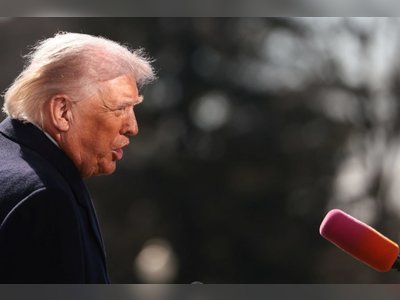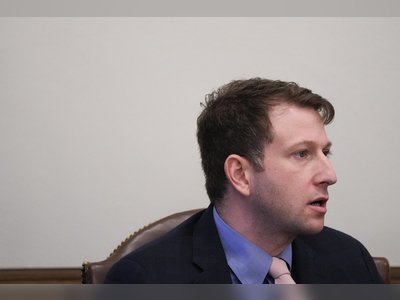White HouseSenateThe HouseSupreme CourtFederal ReserveDOJState DepartmentTreasuryCensusBudget OfficeTrade Representative
WashingTone
Informed by Washington, Defined by Insight
Monday, Mar 02, 2026
WashingTone

U.S.-Thailand Agreement on Nuclear Cooperation: A Strategic Move for Peaceful Energy Development
The United States and Thailand strengthen their nuclear energy partnership through a new agreement, emphasizing regional security, energy requirements, and non-proliferation issues.
On January 10, 2025, President Joe Biden reached a crucial decision regarding the proposed Agreement for Cooperation Between the United States and Thailand on the peaceful use of nuclear energy.
This agreement represents a major advancement in strengthening the bilateral ties between the two countries, while addressing increasing energy demands and enhancing non-proliferation efforts in Southeast Asia.
Background and Purpose of the Agreement
Authorized by the Atomic Energy Act of 1954, the agreement sets up a framework for cooperation in nuclear energy between the U.S. and Thailand.
Thailand has long aimed to pursue a peaceful nuclear energy program to diversify its energy sources, reduce reliance on fossil fuels, and lessen the environmental effects of conventional energy.
The U.S. has extended support to nations seeking nuclear technology for peaceful uses, adhering to strict safeguards to ensure non-proliferation.
This agreement facilitates the exchange of nuclear technology, expertise, and materials for peaceful purposes like energy generation.
Its goal is to promote closer collaboration between the U.S. and Thailand in nuclear safety, regulation, and research, reinforcing a mutual commitment to non-proliferation principles.
This collaboration is part of a broader strategy reflected in similar U.S. agreements with other countries, aiming to foster peaceful nuclear energy development while reducing proliferation risks.
The U.S. Perspective: Non-Proliferation and Security
From the U.S. perspective, the agreement underscores the significance of promoting nuclear energy while safeguarding international security and the non-proliferation regime.
The U.S. has been a global leader in advocating for the peaceful use of nuclear energy, and this agreement with Thailand follows that tradition.
The U.S. government has stressed that implementing this agreement won't pose an unreasonable threat to national or international security.
The Departments of Energy and State have collaborated closely with Thai authorities to ensure the nuclear cooperation framework includes robust safeguards.
These safeguards aim to prevent any diversion of nuclear materials for weaponry and ensure compliance with International Atomic Energy Agency (IAEA) standards.
The agreement reinforces both nations’ commitments to upholding the global non-proliferation treaty (NPT) and accentuates the significance of international cooperation in the safe use of nuclear technology.
As the U.S. continues to strengthen nuclear energy collaboration worldwide, this agreement stands as a model for expanding cooperation without compromising non-proliferation objectives.
Thailand's strategic position in Southeast Asia places it at the center of a region increasingly focused on nuclear security and energy resilience.
Thailand’s Energy Goals and Regional Dynamics
For Thailand, this agreement is a crucial milestone in its drive for sustainable and clean energy sources.
With its growing population and industrial base, Thailand faces rising energy demands.
The nation’s ambitious energy policy embraces a diverse approach to energy production, incorporating nuclear energy significantly in its long-term strategy.
Thailand aims for nuclear energy to contribute substantially to its energy mix by 2036, with nuclear reactors considered integral to the future energy grid.
The agreement supports Thailand’s wider energy objectives, including reducing greenhouse gas emissions, enhancing energy security, and securing a stable, sustainable energy supply.
The peaceful use of nuclear energy is viewed as a potential solution to these challenges, especially as Thailand seeks to lessen its dependence on coal and natural gas imports.
However, developing nuclear energy in Thailand presents its own challenges.
Public opinion and concerns about safety and environmental impacts significantly influence energy policy decisions.
The Thai government must effectively address these concerns through comprehensive regulatory measures and public engagement to garner broader public support for nuclear energy initiatives.
Regional and Global Implications
The agreement also carries significant regional and global ramifications.
Southeast Asia has become increasingly interested in nuclear energy cooperation as countries strive to modernize their energy sectors while adhering to global non-proliferation norms.
The U.S.-Thailand agreement sets a potential precedent for other Southeast Asian nations developing peaceful nuclear energy programs in accordance with international security standards.
Moreover, the agreement enhances U.S.-Thailand relations, deeply rooted in strong economic, political, and defense ties.
Thailand’s strategic role in Southeast Asia and its partnership with the U.S. are key to American efforts to maintain stability and security in the Indo-Pacific region.
Nuclear energy cooperation adds a new dimension to their collaboration, highlighting the strength and depth of their bilateral relationship.
Beyond reinforcing bilateral ties, the agreement could also bolster regional energy stability.
Through close cooperation with the U.S. on nuclear energy, Thailand could pave the way for other regional countries exploring nuclear energy as part of their energy transition strategies.
In this way, the agreement holds promise for wider regional cooperation in energy development, security, and non-proliferation initiatives.
The Path Forward
The signing and subsequent execution of the U.S.-Thailand nuclear cooperation agreement mark the beginning of a potentially enduring and productive partnership.
The U.S. and Thailand must continue collaborating to ensure nuclear energy advances safely, securely, and with environmental responsibility.
Both countries will encounter challenges, including technical and regulatory obstacles, necessitating vigilant oversight and transparent communication between governments and the public.
While the agreement has the potential to significantly boost Thailand’s energy security and environmental targets, its success will ultimately hinge on sustained cooperation and non-proliferation dedication.
The next steps involve implementing the agreement's frameworks, ensuring comprehensive safety and regulatory measures, and facilitating technology and expertise exchange between the nations.
As nuclear energy increasingly becomes central to global energy dialogues, the U.S.-Thailand agreement could serve as a benchmark for future international partnerships in peaceful nuclear technology use.
This agreement represents a major advancement in strengthening the bilateral ties between the two countries, while addressing increasing energy demands and enhancing non-proliferation efforts in Southeast Asia.
Background and Purpose of the Agreement
Authorized by the Atomic Energy Act of 1954, the agreement sets up a framework for cooperation in nuclear energy between the U.S. and Thailand.
Thailand has long aimed to pursue a peaceful nuclear energy program to diversify its energy sources, reduce reliance on fossil fuels, and lessen the environmental effects of conventional energy.
The U.S. has extended support to nations seeking nuclear technology for peaceful uses, adhering to strict safeguards to ensure non-proliferation.
This agreement facilitates the exchange of nuclear technology, expertise, and materials for peaceful purposes like energy generation.
Its goal is to promote closer collaboration between the U.S. and Thailand in nuclear safety, regulation, and research, reinforcing a mutual commitment to non-proliferation principles.
This collaboration is part of a broader strategy reflected in similar U.S. agreements with other countries, aiming to foster peaceful nuclear energy development while reducing proliferation risks.
The U.S. Perspective: Non-Proliferation and Security
From the U.S. perspective, the agreement underscores the significance of promoting nuclear energy while safeguarding international security and the non-proliferation regime.
The U.S. has been a global leader in advocating for the peaceful use of nuclear energy, and this agreement with Thailand follows that tradition.
The U.S. government has stressed that implementing this agreement won't pose an unreasonable threat to national or international security.
The Departments of Energy and State have collaborated closely with Thai authorities to ensure the nuclear cooperation framework includes robust safeguards.
These safeguards aim to prevent any diversion of nuclear materials for weaponry and ensure compliance with International Atomic Energy Agency (IAEA) standards.
The agreement reinforces both nations’ commitments to upholding the global non-proliferation treaty (NPT) and accentuates the significance of international cooperation in the safe use of nuclear technology.
As the U.S. continues to strengthen nuclear energy collaboration worldwide, this agreement stands as a model for expanding cooperation without compromising non-proliferation objectives.
Thailand's strategic position in Southeast Asia places it at the center of a region increasingly focused on nuclear security and energy resilience.
Thailand’s Energy Goals and Regional Dynamics
For Thailand, this agreement is a crucial milestone in its drive for sustainable and clean energy sources.
With its growing population and industrial base, Thailand faces rising energy demands.
The nation’s ambitious energy policy embraces a diverse approach to energy production, incorporating nuclear energy significantly in its long-term strategy.
Thailand aims for nuclear energy to contribute substantially to its energy mix by 2036, with nuclear reactors considered integral to the future energy grid.
The agreement supports Thailand’s wider energy objectives, including reducing greenhouse gas emissions, enhancing energy security, and securing a stable, sustainable energy supply.
The peaceful use of nuclear energy is viewed as a potential solution to these challenges, especially as Thailand seeks to lessen its dependence on coal and natural gas imports.
However, developing nuclear energy in Thailand presents its own challenges.
Public opinion and concerns about safety and environmental impacts significantly influence energy policy decisions.
The Thai government must effectively address these concerns through comprehensive regulatory measures and public engagement to garner broader public support for nuclear energy initiatives.
Regional and Global Implications
The agreement also carries significant regional and global ramifications.
Southeast Asia has become increasingly interested in nuclear energy cooperation as countries strive to modernize their energy sectors while adhering to global non-proliferation norms.
The U.S.-Thailand agreement sets a potential precedent for other Southeast Asian nations developing peaceful nuclear energy programs in accordance with international security standards.
Moreover, the agreement enhances U.S.-Thailand relations, deeply rooted in strong economic, political, and defense ties.
Thailand’s strategic role in Southeast Asia and its partnership with the U.S. are key to American efforts to maintain stability and security in the Indo-Pacific region.
Nuclear energy cooperation adds a new dimension to their collaboration, highlighting the strength and depth of their bilateral relationship.
Beyond reinforcing bilateral ties, the agreement could also bolster regional energy stability.
Through close cooperation with the U.S. on nuclear energy, Thailand could pave the way for other regional countries exploring nuclear energy as part of their energy transition strategies.
In this way, the agreement holds promise for wider regional cooperation in energy development, security, and non-proliferation initiatives.
The Path Forward
The signing and subsequent execution of the U.S.-Thailand nuclear cooperation agreement mark the beginning of a potentially enduring and productive partnership.
The U.S. and Thailand must continue collaborating to ensure nuclear energy advances safely, securely, and with environmental responsibility.
Both countries will encounter challenges, including technical and regulatory obstacles, necessitating vigilant oversight and transparent communication between governments and the public.
While the agreement has the potential to significantly boost Thailand’s energy security and environmental targets, its success will ultimately hinge on sustained cooperation and non-proliferation dedication.
The next steps involve implementing the agreement's frameworks, ensuring comprehensive safety and regulatory measures, and facilitating technology and expertise exchange between the nations.
As nuclear energy increasingly becomes central to global energy dialogues, the U.S.-Thailand agreement could serve as a benchmark for future international partnerships in peaceful nuclear technology use.











